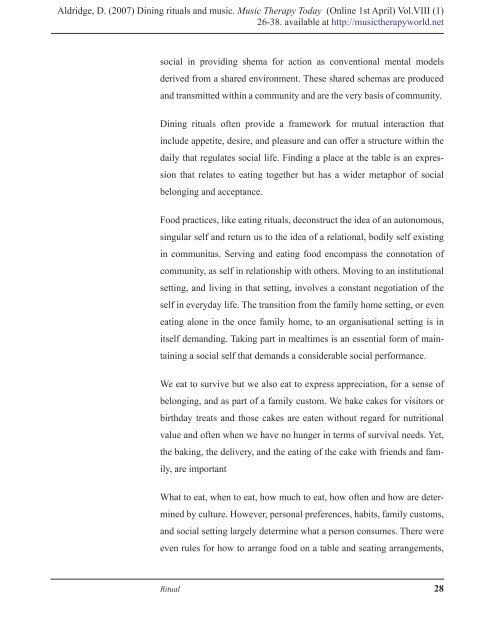Music Therapy Today - World Federation of Music Therapy
Music Therapy Today - World Federation of Music Therapy
Music Therapy Today - World Federation of Music Therapy
Create successful ePaper yourself
Turn your PDF publications into a flip-book with our unique Google optimized e-Paper software.
Aldridge, D. (2007) Dining rituals and music. <strong>Music</strong> <strong>Therapy</strong> <strong>Today</strong> (Online 1st April) Vol.VIII (1)<br />
26-38. available at http://musictherapyworld.net<br />
social in providing shema for action as conventional mental models<br />
derived from a shared environment. These shared schemas are produced<br />
and transmitted within a community and are the very basis <strong>of</strong> community.<br />
Dining rituals <strong>of</strong>ten provide a framework for mutual interaction that<br />
include appetite, desire, and pleasure and can <strong>of</strong>fer a structure within the<br />
daily that regulates social life. Finding a place at the table is an expres-<br />
sion that relates to eating together but has a wider metaphor <strong>of</strong> social<br />
belonging and acceptance.<br />
Food practices, like eating rituals, deconstruct the idea <strong>of</strong> an autonomous,<br />
singular self and return us to the idea <strong>of</strong> a relational, bodily self existing<br />
in communitas. Serving and eating food encompass the connotation <strong>of</strong><br />
community, as self in relationship with others. Moving to an institutional<br />
setting, and living in that setting, involves a constant negotiation <strong>of</strong> the<br />
self in everyday life. The transition from the family home setting, or even<br />
eating alone in the once family home, to an organisational setting is in<br />
itself demanding. Taking part in mealtimes is an essential form <strong>of</strong> main-<br />
taining a social self that demands a considerable social performance.<br />
We eat to survive but we also eat to express appreciation, for a sense <strong>of</strong><br />
belonging, and as part <strong>of</strong> a family custom. We bake cakes for visitors or<br />
birthday treats and those cakes are eaten without regard for nutritional<br />
value and <strong>of</strong>ten when we have no hunger in terms <strong>of</strong> survival needs. Yet,<br />
the baking, the delivery, and the eating <strong>of</strong> the cake with friends and fam-<br />
ily, are important<br />
What to eat, when to eat, how much to eat, how <strong>of</strong>ten and how are deter-<br />
mined by culture. However, personal preferences, habits, family customs,<br />
and social setting largely determine what a person consumes. There were<br />
even rules for how to arrange food on a table and seating arrangements,<br />
Ritual 28

















